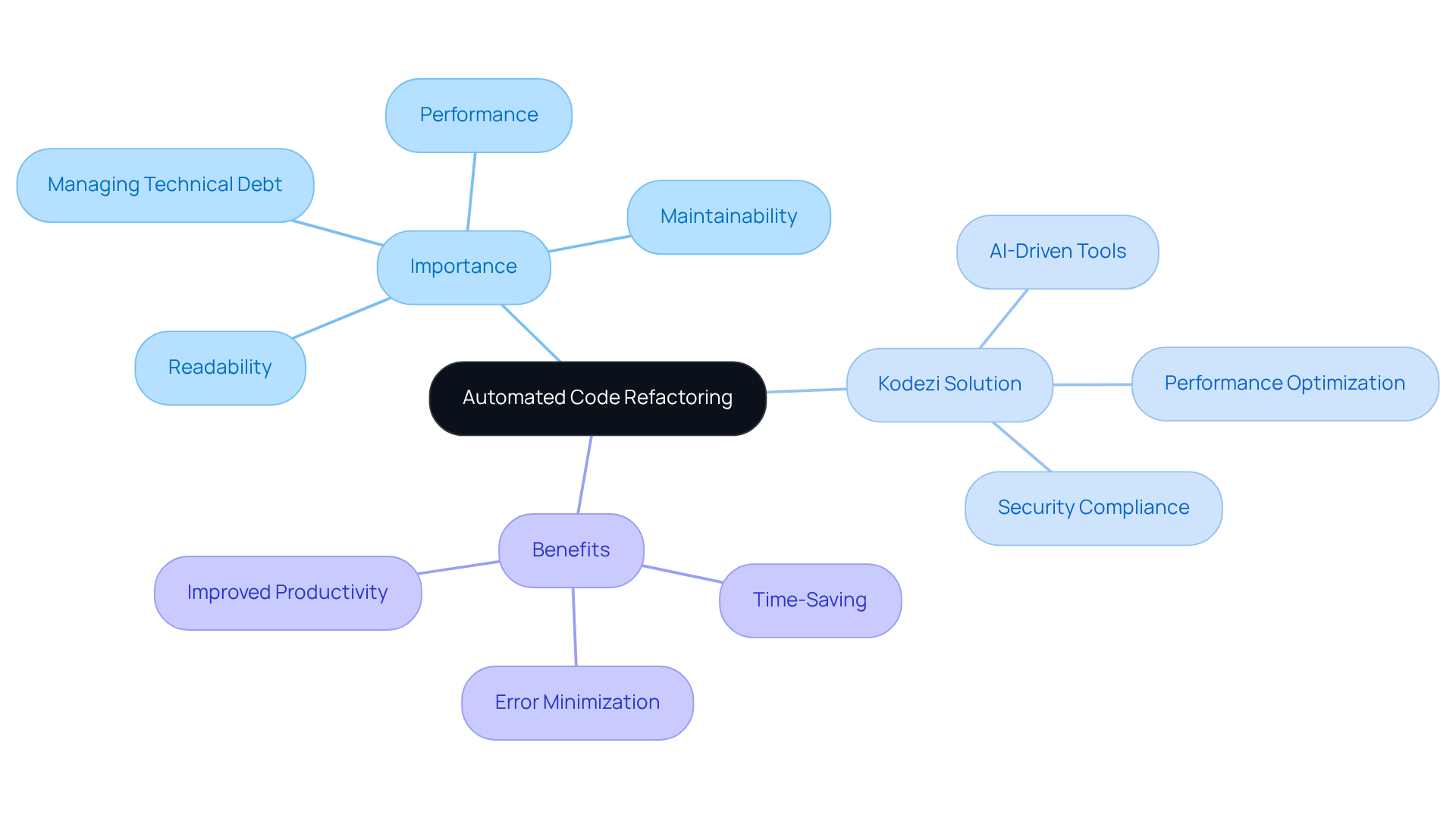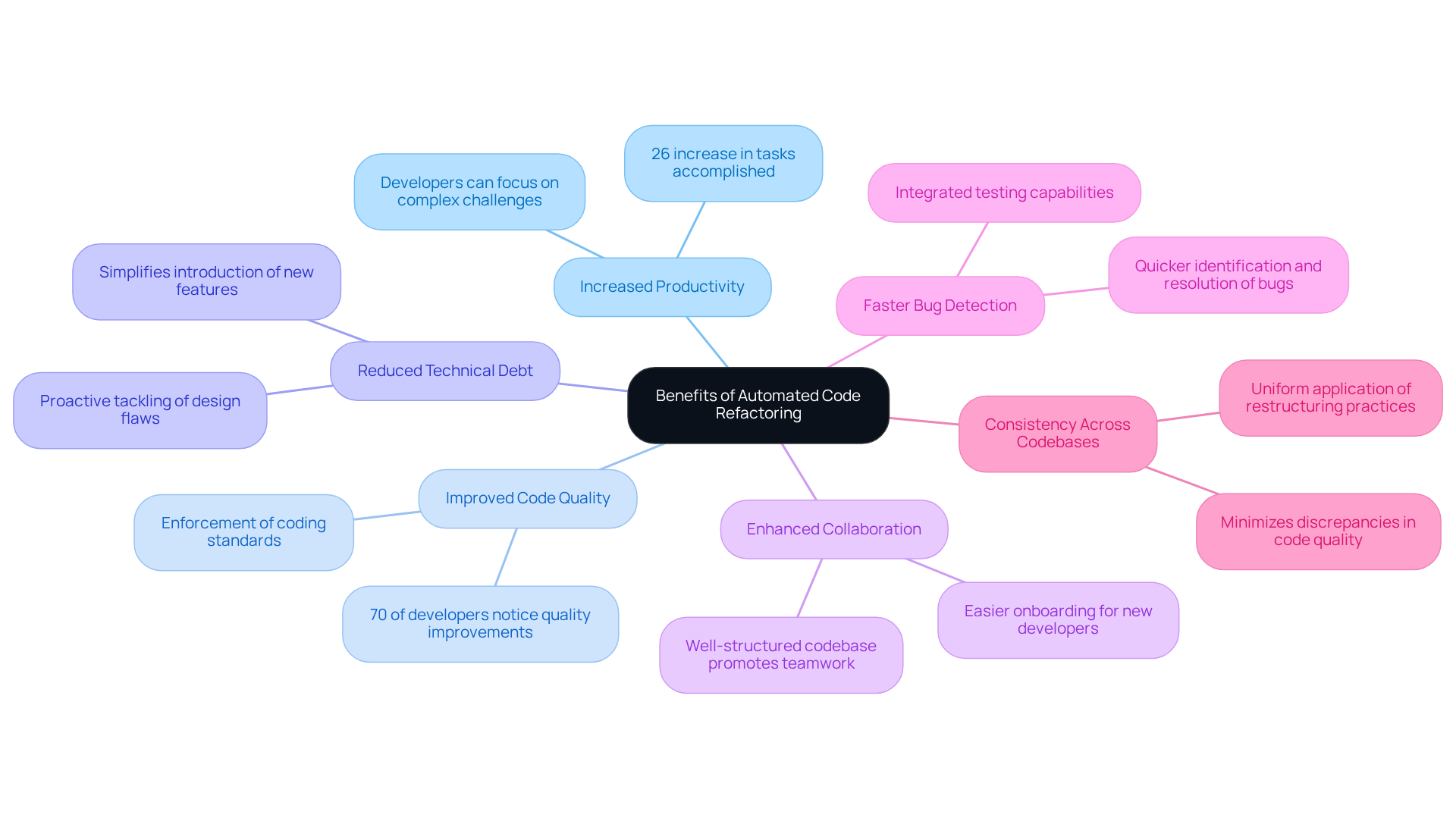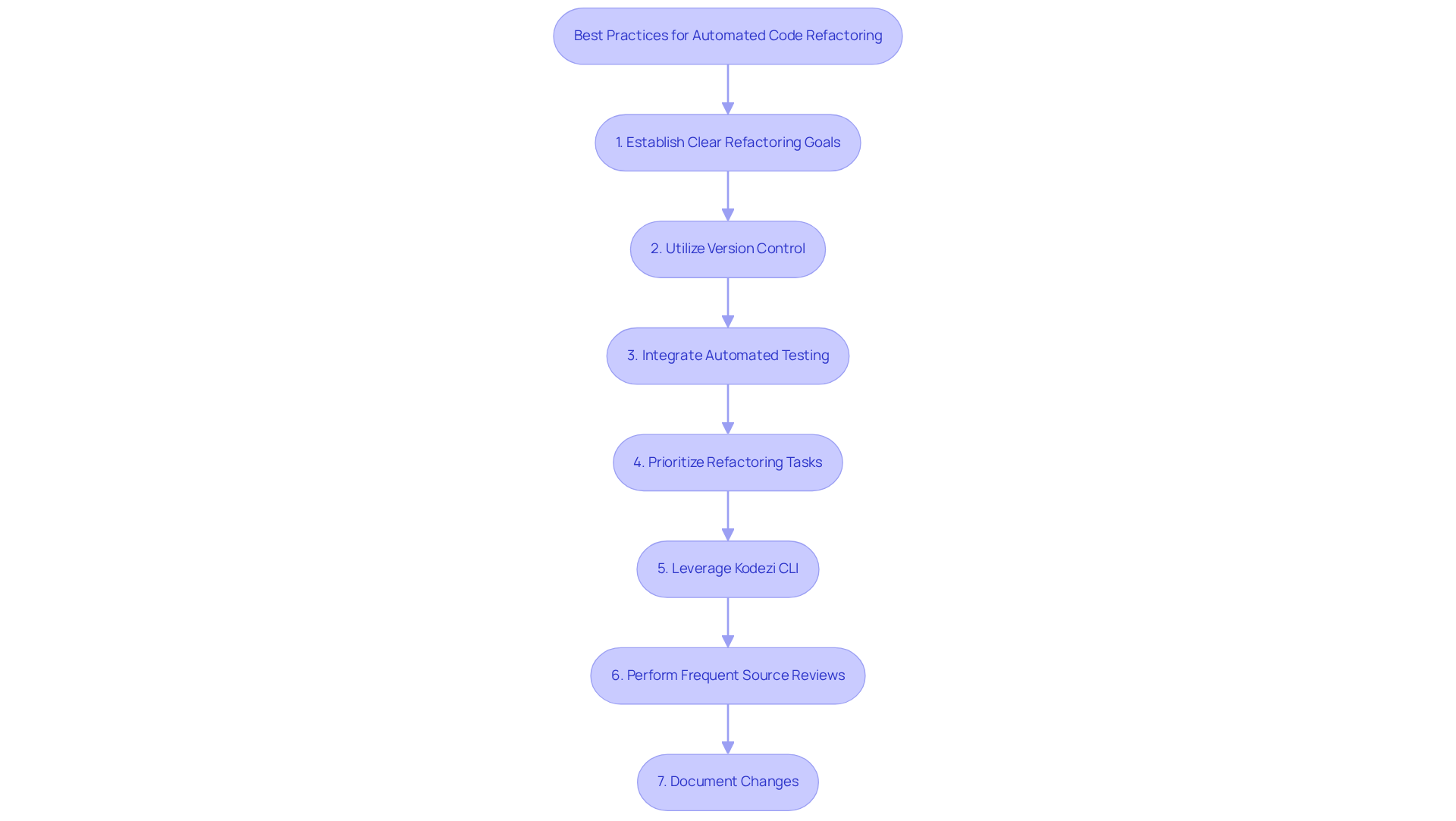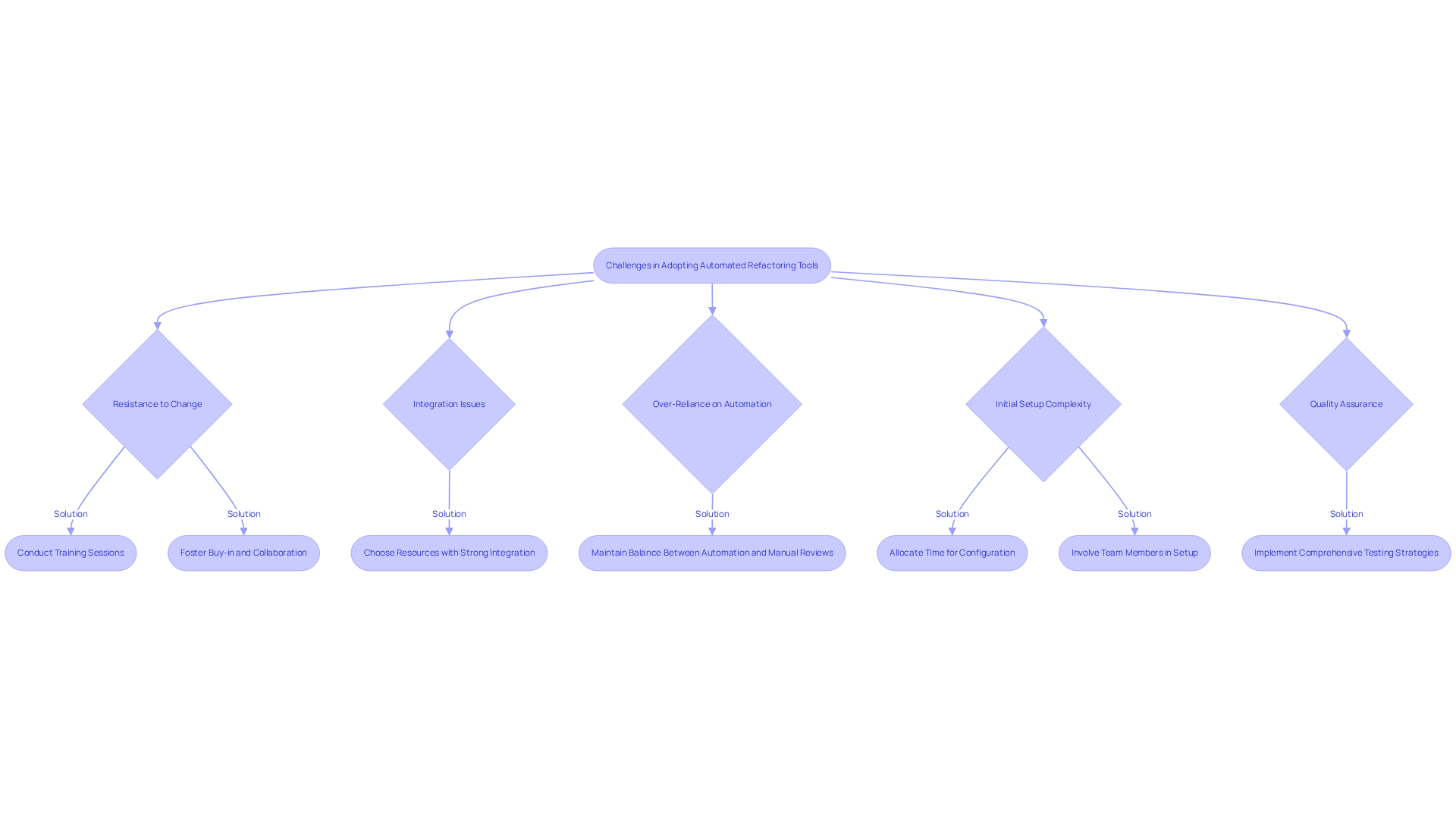Overview
In the world of software development, coding challenges are a common hurdle that teams face. Automated code refactoring offers a solution by enhancing efficiency and quality. Tools like Kodezi allow developers to restructure their code, improving readability, maintainability, and performance without altering its functionality. Furthermore, Kodezi not only saves time and reduces errors but also fosters better collaboration and consistent coding standards.
Why is this important? By utilizing Kodezi, developers can achieve healthier codebases and increased productivity. Imagine a scenario where your team spends less time on debugging and more time innovating. The benefits of using Kodezi are clear: improved productivity and superior code quality.
In addition, Kodezi's features facilitate a more streamlined development process. By encouraging consistent coding practices, teams can work more cohesively, leading to faster project completion. So, why not explore the tools available on the Kodezi platform? With the right resources, you can transform your coding practices and elevate your team's performance.
Introduction
In the intricate world of software development, managing complex codebases often feels like navigating a labyrinth. Developers frequently encounter challenges that can hinder their progress. However, automated code refactoring emerges as a crucial strategy, providing a pathway to enhance code readability, maintainability, and overall performance without altering functionality.
Enter Kodezi, a transformative tool that addresses these challenges head-on. With its advanced features, Kodezi empowers teams to unlock significant gains in productivity and code quality. By streamlining the refactoring process, developers can focus on what truly matters—delivering exceptional software.
Yet, the journey to effective automated refactoring is not without its challenges. How can developers balance the benefits of automation with the need for thorough manual oversight? This is where Kodezi shines, offering solutions that ensure developers maintain control while reaping the rewards of efficiency.
By exploring the tools available on the Kodezi platform, developers can not only improve their coding practices but also enhance their overall workflow. The benefits of using Kodezi are clear: increased productivity, improved code quality, and a more manageable codebase. Are you ready to elevate your development experience?
Define Automated Code Refactoring and Its Importance
In the realm of software development, developers often grapple with the challenges of managing complex codebases. Automated code refactoring emerges as a vital solution, enabling teams to restructure existing scripts for enhanced readability, maintainability, and performance without altering their external behavior. This practice is crucial for managing technical debt and improving software quality, ultimately streamlining the development process.
How does Kodezi address these coding challenges? By utilizing automated tools, Kodezi empowers developers to efficiently identify and rectify codebase issues, optimize performance, and ensure security compliance. Its AI-driven features facilitate swift problem solving and enhance formatting, promoting the upkeep of a tidy and flexible codebase.
The benefits of using Kodezi are significant. Not only does this method save time, but it also minimizes the risk of introducing errors during manual modifications. By adopting Kodezi, developers can maintain healthy codebases over time, leading to improved productivity and code quality.
Ready to enhance your coding practices? Explore the powerful tools available on the Kodezi platform and experience the difference automated code refactoring can make in your development workflow.

Highlight Benefits of Automated Code Refactoring for Efficiency and Quality
In the fast-paced world of software development, developers often grapple with coding challenges that can hinder their efficiency and quality. Automated code refactoring emerges as a crucial solution, delivering significant benefits that enhance both productivity and code quality. Kodezi CLI stands out as a prime example of how automation can transform the development landscape.
Increased Productivity: By automating repetitive refactoring tasks, developers can redirect their focus towards more complex challenges, leading to quicker feature delivery. Kodezi CLI autonomously enhances codebases and resolves bugs before they reach production, showcasing remarkable productivity gains. Research indicates a 26% increase in tasks accomplished among software development teams utilizing automated solutions, though a 7.2% decline in delivery stability has been observed, underscoring the importance of careful implementation.
Improved Code Quality: Tools like Kodezi CLI enforce coding standards and best practices, resulting in cleaner, more maintainable code. This consistency not only boosts readability but also eases the onboarding process for new developers, helping to bridge the productivity gap between junior and senior team members. Notably, 70% of developers reporting productivity improvements also observe enhancements in software quality, reinforcing the positive impact of automated code refactoring. Additionally, Kodezi CLI addresses performance bottlenecks and ensures adherence to the latest security best practices.
Reduced Technical Debt: Regular refactoring plays a vital role in minimizing the accumulation of technical debt, simplifying the introduction of new features and adaptation to changing requirements. By proactively tackling design flaws, teams can maintain a healthier codebase, which is essential for long-term project success. Kodezi CLI's automated debugging features, along with automated code refactoring, help teams remain vigilant against over-reliance on AI recommendations, which could potentially compromise code quality.
Enhanced Collaboration: A well-structured codebase promotes better team collaboration, enabling developers to easily understand and work with each other's contributions. This collaborative environment is vital for agile methodologies, where adaptability and teamwork are paramount.
Faster Bug Detection: Many automated restructuring tools, including Kodezi CLI, come equipped with integrated testing capabilities, facilitating quicker identification and resolution of bugs. This proactive approach to quality assurance significantly reduces the time spent on debugging, thereby enhancing overall development efficiency.
Consistency Across Codebases: Automation ensures the uniform application of restructuring practices, minimizing discrepancies and enhancing overall coherence. Kodezi CLI plays a crucial role in maintaining high standards across diverse projects and teams, ultimately leading to a more robust software product.
Are you ready to explore how Kodezi can elevate your coding practices? Discover the tools available on the platform and unlock your team's full potential.

Implement Best Practices for Effective Automated Code Refactoring
To effectively tackle the challenges of automated code refactoring, it's crucial to consider several best practices that can significantly enhance your coding experience:
-
Establish Clear Refactoring Goals: What specific objectives do you have in mind for your refactoring efforts? Defining these goals—such as improving performance or reducing cyclomatic complexity—can guide your process. Aim for a target of at least 80% coverage to bolster reliability and functionality.
-
Utilize Version Control: Are you leveraging version control systems like Git? Using these tools is essential for tracking changes and enabling easy rollbacks when necessary. Disciplined version control practices not only help in resolving merge conflicts efficiently but also contribute to overall software quality.
-
Integrate Automated Testing: Have you established automated tests before restructuring? This step is vital to ensure that functionality remains intact. Incremental testing during improvements allows you to catch subtle changes early, thereby reducing the risk of introducing defects.
-
Prioritize Refactoring Tasks: Where should you focus your refactoring efforts? Concentrating on high-impact areas of the codebase can yield the most significant improvements in quality and performance. Projects with high software churn may indicate instability, making them prime candidates for refactoring.
-
Leverage Kodezi CLI: Have you considered using Kodezi CLI? This AI-driven tool, designed for B2B engineering groups, specializes in automated code refactoring to manage intricate restructuring tasks, enhancing your overall process. Kodezi CLI can lead to 40% quicker review cycles and 60% fewer regression errors, allowing teams to focus on feature development and quality enhancements before production. Additionally, it autonomously fixes bugs before they reach production, ensuring a more reliable codebase.
-
Perform Frequent Source Reviews: How often do you conduct source evaluations? Establishing a routine for these reviews ensures that your restructuring efforts align with group standards and best practices. Regular evaluations help maintain software quality and promote knowledge exchange among team members.
-
Document Changes: Are you maintaining thorough documentation of your restructuring changes? High-quality documentation—defined as greater than 80%—provides essential context for future developers and facilitates knowledge sharing, ultimately enhancing understandability and reducing the risk of errors.
For a quick start, why not check out our 5-minute quickstart guide? Experience Kodezi CLI in action with a demo and see how it can transform your coding practices.

Address Challenges and Solutions in Adopting Automated Refactoring Tools
Adopting automated code refactoring can significantly boost development efficiency, yet several challenges may arise. Have you ever faced resistance to change within your team? Team members often hesitate to adopt new resources and processes. To combat this, organizations should conduct training sessions that clearly demonstrate the benefits of automation, fostering a culture of buy-in and collaboration.
Furthermore, integration issues can pose significant hurdles. Automated systems may struggle to integrate seamlessly with existing development environments. Choosing resources with strong integration capabilities customized for your tech stack can alleviate this challenge, ensuring a smoother transition.
Similarly, there is a risk of over-reliance on automation. Teams may become excessively dependent on automated resources, potentially overlooking crucial manual reviews. Maintaining a balance between automation and regular manual assessments is crucial for preserving code quality and integrity.
In addition, the initial setup complexity cannot be overlooked. The setup procedure for automated transformation resources can be time-consuming and intricate. Allocating dedicated time for configuration and involving group members in the setup process can facilitate a smoother transition and enhance group ownership of the resources.
Lastly, quality assurance is vital. Automated code modification can inadvertently introduce subtle bugs if not monitored closely. Implementing comprehensive testing strategies early in the development cycle is essential to catch and address any issues promptly, ensuring the reliability of the codebase.
By addressing these challenges with targeted solutions, teams can effectively integrate automated code refactoring tools, enhancing both efficiency and code quality. Explore the tools available on Kodezi to experience these benefits firsthand.

Conclusion
Automated code refactoring addresses the complex challenges developers face in maintaining and enhancing codebases. Tools like Kodezi provide solutions that lead to clearer, more maintainable code, significantly boosting productivity and software quality. This practice not only reduces technical debt but also cultivates a collaborative environment where teams can excel.
The article outlines several key benefits of automated code refactoring. These include:
- Increased productivity through the automation of repetitive tasks
- Enhanced code quality by adhering to best practices
- Diminished technical debt that allows for smoother feature integration
Furthermore, it underscores the importance of implementing best practices, such as:
- Setting clear goals
- Utilizing version control
- Integrating automated testing
to ensure successful refactoring efforts.
Ultimately, adopting automated code refactoring transcends merely incorporating new tools; it represents a strategic initiative aimed at improving the overall efficiency and quality of software development. By proactively addressing potential challenges and focusing on effective implementation strategies, teams can unlock the full potential of automation, resulting in robust and reliable codebases. Explore the possibilities that automated code refactoring offers and consider integrating these practices into your development workflow for lasting improvements.
Frequently Asked Questions
What is automated code refactoring?
Automated code refactoring is the process of restructuring existing code to improve its readability, maintainability, and performance without changing its external behavior.
Why is automated code refactoring important in software development?
It is important because it helps manage technical debt, improves software quality, and streamlines the development process.
How does Kodezi help developers with coding challenges?
Kodezi utilizes automated tools to help developers identify and fix codebase issues, optimize performance, and ensure security compliance.
What are the key features of Kodezi?
Kodezi offers AI-driven features that facilitate quick problem solving and enhance code formatting, promoting a tidy and flexible codebase.
What are the benefits of using Kodezi for code refactoring?
The benefits include time savings, reduced risk of errors during manual modifications, and the ability to maintain healthy codebases, which leads to improved productivity and code quality.
How can I start using Kodezi for automated code refactoring?
You can explore the powerful tools available on the Kodezi platform to enhance your coding practices and experience the benefits of automated code refactoring.




